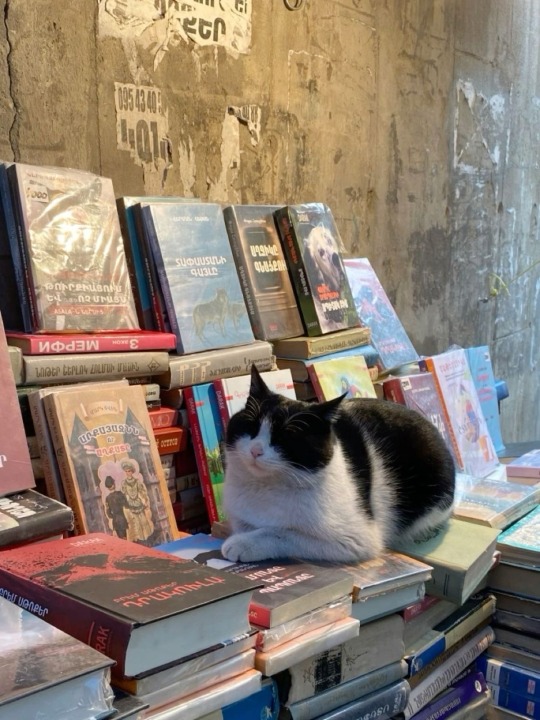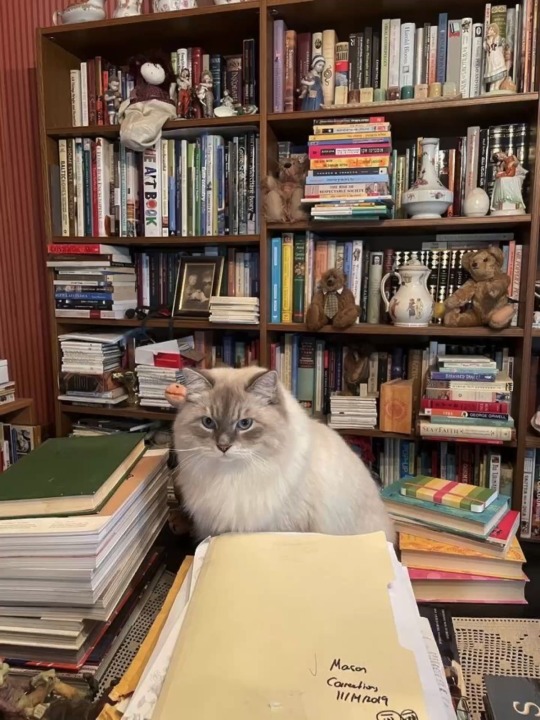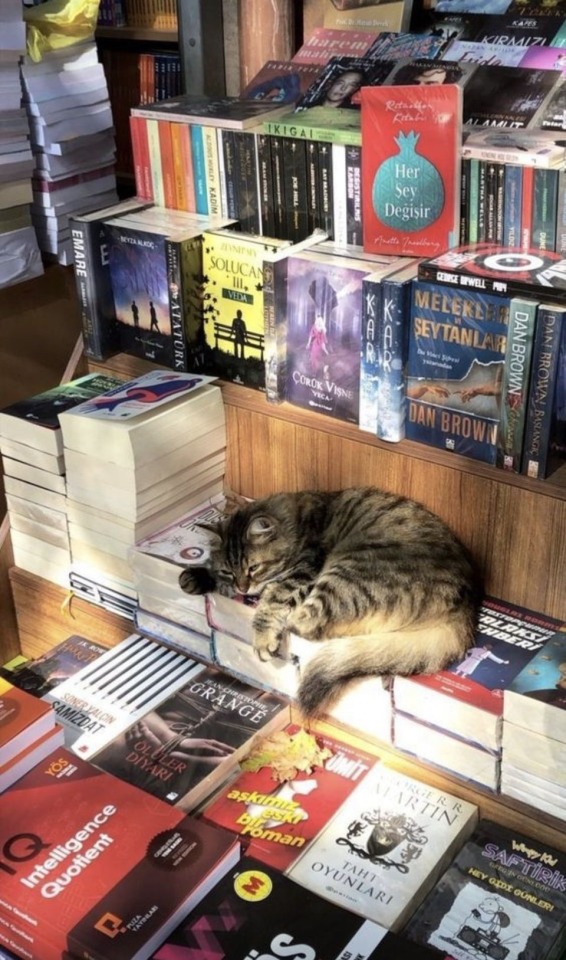#books in review
Explore tagged Tumblr posts
Text
My 2025 Recap
Books Read:
Tell Me I'm Worthless by Alison Rumfitt
Such a Pretty Smile by Kristi DeMeester
Things Have Gotten Worse Since We Last Spoke and Other Misfortunes by Eric LaRocca
Dead Silence by S.A. Barnes
Ghost Eaters by Clay McLeod Chapman
The Cabin at the End of the World by Paul Tremblay
Our Wives Under the Sea by Julia Armfield
The Lightning Thief by Rick Riordan
The Sea of Monsters by Rick Riordan
The Titan's Curse by Rick Riordan
The Battle of the Labyrinth by Rick Riordan
The Last Olympian by Rick Riordan
Lolita by Vladimir Nabokov
Flowers in the Attic by V.C. Andrews
Whalefall by Daniel Kraus
What Moves the Dead by T. Kingfisher
Ghost Station by S.A. Barnes
Survivor Song by Paul Tremblay
Gorgeous Gruesome Faces by Linda Cheng
Incidents Around the House by Josh Malerman
Horrorstör by Grady Hendrix
American Rapture by CJ Leede
TOTAL: 23 (59% of books borrowed)
Books DNF'd
Neon Gods by Katee Robert
Manhunt by Gretchen Felker-Martin
I'm Thinking of Ending Things by Iain Reid
Haunted by Chuck Palahnuik
Camp Damascus by Chuck Tingle
The Hunger by Alma Katsu
Gone Girl by Gillian Flynn
The Other Black Girl by Zakiya Dalila Harris
Something Wicked This Way Comes by Ray Bradbury
The Shining Girls by Lauren Beukes
The Only Good Indians by Stephen Graham Jones
Exquisite Corpse by Poppy Z. Brite
Brainwyrms by Alison Rumfitt
Gerald's Game by Stephen King
Near the Bone by Christina Henry
Maeve Fly by CJ Leede
TOTAL: 16 (41% of books borrowed)
Top Genres:
Horror (52%)
Thriller (21%)
Mythology (21%)
Suspense (17%)
Queer (17%)
Fantasy (13%)
Ratings by Percent:
14 reviews total
5/5: 5 (36%)
4.5/5: 4 (29%)
4/5: 2 (14%)
3.5/5: 2 (14%)
2.5/5: 1 (7%)
2 notes
·
View notes
Text
i guess i completely missed the iliad and odyssey renaissance happening on this godforsaken site
#can i ask why??#can i legally question why homer is trending this year?#what did i miss?????#year in review#books in review#the odyssey#the iliad
16 notes
·
View notes
Text
2024 Comics in Review
(I was bored today, and I didn't feel like doing the things I actually needed to do for uni, so I adapted by python code for the book tracker I made for a comic book version)
Total number of issues read in 2024: 103.
Full list below:

Legend: (because I am not up to date with everything and I wanted to have a way to see which comic books I still have to read)

The comics in the same order as in the above table, highlighting the number of issues:

The comic with the largest amount of issues: Batman: Wayne Family Adventures, with the least: Daredevil: Woman Without Fear (Vol 2).
Per publisher:

Per protagonist:

(I only listed Batman Family for Wayne Family Adventures cause I couldn't be bothered listing everyone and it's the only batman comic I've read in 2024. I might add everyone at some point) (There are also probably characters missing but I've been doing this all day and going back to the comics I read is more work that I had expected)
Most common protagonists: Batman Family (30), Daredevil (Matt Murdock) (28) and Daredevil (Eleckta Natchios) (27)
Per antagonist:

(The first antagonist, and similarly for protoganist, -, is because I didn't name any characters for the TKO western I read, and because I couldn't be bothered to name any Batman antagonist. Might fix that at some point)
Most common antagonists: The Kingpin (Wilson Fisk) (28*), Seven Deadly Sins (16), Bullseye (16*)
*the count for Fisk and Bullseye is most likely wrong cause the code now counts them as villains in all of Daredevil Vol 8, which is not the case. Might fix that at some point (but that means I need to give a separate entry for each issue and I don't really want to do that lmao)
Per year(s) of publication:

Year with the least amount on issues published: 2009 for Deadpool: Suicide Kings, with the most: 2021-2025 for Wayne Family Adventures.
(I should try to make it so that the years overlap but I have no idea how to even begin with that)
I like how this then makes it even clearer that I have fallen down the Daredevil rabbit hole lmao
#my nerd ass loves making plots#thesquidkid#books in review#(<- just to keep this and the book one in the same tag)#(will also update with the 2025 comics)#(which should hopefully be more accurate cause I won't have to spend an entire day looking up who appears where on wiki cause i forgot)#speaking of forgetting i just now realised i forgot about mike murdock 😭����#and now im sad again cause i remembered hes in devil reigns and i dont like what zdarsky did to him#ideally i would put a different entry for each issue so it accurately shows the characters per issue#cause she hulk and wolverine appear in dd vol 8 for instance but i didnt add them cause they only appear like once#comic books#daredevil obsession running deep here
0 notes
Text




cats and libraries ۫ ꣑ৎ
#book#reading#booklr#books and reading#book review#bookworm#bookish#book photography#bibliophile#book blog#currently reading#book club#library#book lover#bookstore#books to read#book tumblr#book aesthetic#book community#books books books#bookshelves#bookshelf#bookstagram#books & libraries#books and literature#pinterest#source: pinterest#cats#cats of tumblr#catsoftheworld
17K notes
·
View notes
Text

Books in Review - Nora Bossong: "Reichskanzlerplatz"
The theme of "Reichskanzlerplatz" offers great potential. In my opinion, however, it is not fully realised. The marketing of the book creates the expectation that Magda Goebbels is the central figure in the story. This is not the case. In reality, she is a secondary character. She could also be described as a narrative "hook" around which the actual story unfolds. Starting from her, the narrator begins his reports. As soon as he has completed a story, he returns to it to describe new events. The narrator himself therefore forms the centre of the book - his feelings, experiences and reflections are at the forefront. The reader has to come to terms with this. Although this does not fulfil the expectations conveyed by advertising, it nevertheless represents a valuable approach. After all, there are already numerous documentaries, biographies or novel biographies about Magda Goebbels, so this narrative perspective, which focuses more on the narrator, is certainly enriching. The value of the book lies above all in the multi-layered experiences and assessments of the narrator, who is involved in the historical events through his relationship with Magda Goebbels. These represent a kind of "window" through which the reader gains an insight into the devastating consequences of the Nazi seizure of power. Bossong allows the narrator to describe these events (about which today's readers should generally be well informed) in a way that appears superficially uninvolved - and it is precisely this that allows the full cruelty of the historical events to unfold. There is no need for detailed descriptions of the terrible, often unspeakable historical facts. This apparent distance creates an even stronger emotional impact. In the second part of the book, it leaves the reader constantly asking "Why?". Why did an intelligent woman as well versed in art, music and literature as Magda Goebbels act as she did? Why does the narrator act the way he does, even though, as an employee in the Nazi official apparatus, he sees through the regime - even though he thinks differently, hopes differently and, above all, loves differently? In the end, this book leaves the reader with the question, how would I have behaved and why?
If you look at this story from the perspective of Stoic philosophy, you come to the conclusion - as with Gustave Flaubert's book "Madame Bovary" - that the central characters in this book had no idea of their "Inner citadel" and accordingly neither nurtured nor strengthened it. And it was the lack of this inner bastion of resistance that allowed the external influencing factors of wealth, recognition, admiration, influence (for Goebbels) or fear, threat, loss of job and freedom (for the narrator) to take control of these two people. When external orders are destroyed (as happened in the First World War and the economic consequences in the Weimar Republic), the inner order of man becomes all the more important. If it does not exist or is only partially present, if it is not or only slightly consolidated, this can have devastating consequences for the individual, but also for an entire nation. Reichskanzlerplatz is a good, indeed a necessary book. It is an important book at a time when dealing with the history of National Socialism and its consequences is more topical than ever.
0 notes
Text

love elizabeth s.
#original poem#original quote#love elizabeth s#love poem#love poetry#love letter#relationship quotes#relatable quotes#relationships#dark acadamia quotes#quotes#love quotes#sylvia plath#virginia woolf#my poem#poetry#poetry community#spilled thoughts#spilled ink#spilled poem#poem#writing#books#booklr#reading#book review#book lover#dark academia#dark academia quotes#short poem
17K notes
·
View notes
Text

#aesthetic#books books books#books#booklr#bookblr#books & libraries#book quote#book review#book quotes#light academia#dark acadamia quotes#poetry#writers and poets#quotes#dark academia#wlw post#art#classic#classics#classic books
22K notes
·
View notes
Text
reviews on famous novel "don't create the torment nexus" are in!
one reviewer gives a one star review, saying, "i can't believe the writer would let the torment nexus exist in this world. doesn't he realize how awful the torment nexus would be in real life?"
another reviewer, with a two star review, says "yeah, the book was okay, the characters were all great, but i just can't get over the torment nexus. why is there such a terrible thing? don't they realize they'd be better off without the torment nexus?"
a third reviewer gave five stars, saying "i'm glad this book was written. they really need to create the torment nexus, that would really improve civilization by a lot." in the comment replies to this review, the reviewer indicated that this review was not sarcasm.
overall, "don't create the torment nexus" has a rating of two stars. find it in these stores......
7K notes
·
View notes
Text
Somedays I want to pull my heart out of my chest just so I can stop feeling this way.
#bibliophile#book blog#bookish#books#bookworm#literature#spilled thoughts#book review#poems on tumblr#spilled poetry#poets on tumblr#original poem#poetry#quoteoftheday#quotes
3K notes
·
View notes
Text

Dostoevsky, The Idiot
Caspar David Friedrich, Gartenterrasse, 1811
(Collage: instagram @emmalinatotes)
#quotes#spilled thoughts#love#reading#currently reading#bookish#booklr#book review#books#aesthetic#art#collage#artwork#fyodor dostoevsky#classic#love quotes#dark and beautiful#dark aesthetic#dark academia
6K notes
·
View notes
Text
25 Laws of power for women
Conceal your goals especially the ones that are appealing. Losing weight, reinventing yourself, marrying wealthy. Instead talk about your altruistic goals - to help children, invest in education, this will chase insecure people with vile intentions.
Do not give anyone your source of power: Was is a book that changed your life? a mentor? a movie? Never give up your secret to success. If forced to do say allude to God, the universe, the a random phenomenon
Use the patriarchy to your favor; we live in a world that is, only associate with men who have power, use that power for good.
Never appear too perfect but be selectively vulnerable when needed. Only share something that you will be comfortable saying. You might say “I forget my keys all the time,” “I don’t know how to perfectly park a car “. But never disclose something you are not comfortable with just because you are afraid of being perfect.
Maintain distance in relationships. Friends are the best and you need them. But if you feel that they are becoming too dependent, see them at your own will. But also the reverse could be the case. Your friend may keep a distance, and that is the way of life. You have got to move on from it.
Develop your own style that makes you unique, beautiful, and elegant. Avoid trying to fit in the crowd of people who claim to care less about their style yet have too many opinions about other women’s style
Avoid male friends at all cost, you will have male colleagues, male bosses, male acquaintances, business partners. Keep it that way. You do not want a Truman Capote divulging your secrets to the world. Do not keep a man who does not fit your standard.
You do not have to win at every game. Pick and choose what is best for you and leave room for others. And step down if you have attained that level of success, do not let the society do it for you.
Trust people but remember that we are all humans. So trust with discretion!
Confuse people with kindness; people are not always comfortable with beautiful and intelligent women. That power is too intimidating so confuse them by being genuinely generous, curious, kind, and passionate.
Keep your strong opinions to yourself.. if you support a movement, a way of life, do so silently.
We all have dirty laundry, wash them privately, don’t expose yourself. Remain silent when people try to attack you or shame you. Whatever is not confirmed is not true. You are the only one who knows all the truth about you.
Don’t attract pity or praise: People who pity you do not help you, in fact they might think that you are weak and could mock you at their annual gossipping meeting. And if you are doing things for the sake of praise you are wasting your time.
Choose yourself all the time; never put any one’s feelings above yours.
Trust your own intuition if you feel someone is being malicious towards you, giving you back handed compliments then you should let them go
Never speak bad of another woman. Do not lazy around gossipping. Keep your hands clean and your conscience clear.
Avoid women with low self esteem they will bring you down. For some reason they do not like seeing other women who are doing better than them
Be careful who you seek validation from. Not everyone needs to be pleased. If they are in no way capable of contributing to your life in the ways you prefer, then don’t ask them for their opinions or please them.
Do not compete with other women, if you do you are only putting them on a pedestal. You are making the the standard by which you measure your progress. If you do compete, begin digging your grave.
Do not give unsolicited advice, do not share the inner workings of your mind, If your mouth is very charitable you better start journaling.
Be well-rounded and interesting. It attracts people. It also keeps you busy because you are continually improving and learning. An idle mind is an easily subdued one.
Avoid women who want to live vicariously through you; they want to know who you know, shop where you shop, befriend who you befriend, wear what you wear.
Pay attention to the source of your discomfort; get rid of them. You tell them your dreams and they remind you of all your hindrances. They ask why are you dressed so fancy as though fancy isn’t subjective. They undermine you interests and goals. They will also be quick to bring you down because they are afraid of your potential.
Do not fear power or please power. When we see powerful people we try to hard to befriend them, to be close to them but you need to be comfortable without them. Don’t push yourself in the name of friendship, do not try too hard to be in their inner circle. Your independence of mind is the most important. Instead become a powerful woman, aloof to the presence of power but aware of its importance. Be an ingenious and intelligent and use your creativity to uplift yourself. When you do so it will be hard to ignore you. Even the powerful will become an ally.
Enjoy moments of solitude. Use that time to develop yourself, improve your body, learn new skills, create with your mind, read widely, become more elegant, then launch yourself.
Remember the most powerful women are the most intelligent. Inspired by Robert Greene's 48 Laws of Power. Use at your discretion.
#self improvement#self love#growth#mindfulness#self development#beauty#education#self care#classy#self help#power#new books#booklover#book review#book quotes#books#biography#self control#self discipline#self worth#students#smart#emotions#emotional intelligence#self growth#discipline#get motivated#life goals#gratitude#femininity journey
11K notes
·
View notes
Text
realistically there is no chance i will have time to read, imma still bring a book though
#book tumblr#bookstagram#readers#book lover#currently reading#book thoughts#book quotes#bookworm#book review#book blog#books#bookblr#reading
5K notes
·
View notes
Text
2024 Books in Review
(yes, I am a nerd, yes I made a Python code to make silly graphs of the books I read)
Number of books read in 2024*: 24 (purely coincidental)
List below:

The books in the same order as in the table, highlighting the wordcount:

(The book with the biggest wordcount is: Une histoire des mathématiques: Routes et dédales, the books with the smallest is: Daredevil: Woman Without Fear (#1-#4)**)


(I have read 19 books in English, and 4 in French, including one translation)



(Oldest book read: The Picture of Dorian Grey, 1891. Most recent books read: Fall of the House of X (#1-#5) and Daredevil: Woman Without Fear (#1-#4), 2024)
*only counting books that were published and that I read in their entirety in 2024
**for comic books, I then only counted comic books for which I have finished the entire run in 2024, with a symbolic 1000 words/issue
(If anyone wants the Python code for this, I'll happily share it, I also want to make one exclusively for comic books with character info and all, but I haven't gotten around to it yet)
(I also want to do one for fanfic, but I don't instinctively keep track of what I read)
#thesquidkid#books in review#this is way more fun than just putting in the book titles in goodreads#gotta use my maths degree somehow right
1 note
·
View note
Text

Undine (sculpture), 1904 - 1988.
by Isamu Noguchi.
#bookish#book review#reading#books#poetry#authors#book blog#booklr#writing#studyblr#book worm#books & libraries#greek mythology#history#art#art history#art blog#art gallery#art aesthetic#english literature#english#vintage#dark academia#academia#light academia#cottagecore#aesthetic#education#punk academia#art museum
2K notes
·
View notes
Text

Books in review - Nele Neuhaus: In ewiger Freundschaft ("Amitié éternelle")
In the 10th volume of her Bodenstein-Kirchoff crime series, Nele Neuhaus gives us a glimpse into the German literary scene. And - who wouldn't have guessed it already - this literary scene is not only small, it's also murderous ;)
But, despite all the fun and irony that the author manages to weave in again and again, the core of the book is about a significant, one could almost say biblical, topic: truth and lies. What influence do truth and lies have on people's relationships with one another? What (perhaps irreversible) consequences does it have when lies dominate our relationships? What (lasting) suffering do lies cause and what (lasting) suffering can people be spared if they live in truth? Is lying only a lie when we tell the untruth or conceal the truth? Or does it also mean living in a lie if we simply close our eyes to (hard) truths and pretend they don't exist? In her book "In ewiger Freundschaft" ("Eternal Friendship" / "Amitié éternelle"), Nele Neuhaus introduces a number of characters and repeatedly sheds light on their respective relationship to the truth over the course of the story. Each character has his or her own reasons for living truthfully or choosing to live a life of lies. The two detectives, Oliver von Bodenstein and Pia Kirchoff (now Sander) also find themselves in situations in which they have to face hard truths and make appropriate decisions. For the reader who wants to delve into the depths of this story, it is advisable to have a list or a summary sheet to hand right at the beginning, on which he/she can note the names of the characters, their roles and their position on truth or lies. In this way, chapter by chapter, a fascinating picture emerges of the spider's web of lies and deceit in which the characters in the story have become entangled and which now holds them captive. One is inevitably reminded of the famous words from Sir Walter Scott's epic poem "Marmion: A Tale of Flodden Field", which reads: "Oh what a tangled web we weave/When first we practice to deceive". As the characters in the novel are caught in a web of lies and deceit, the friendship that binds them together is of course not a true friendship. It is merely a kind of partnership of convenience, born out of the fear of having to face the truth. It was founded on the fear of discovery and the vain pursuit of a possible career. This community of convenience disguised as friendship begins to break down at the very moment the light of truth is shone on it from outside. And it becomes clear that no real "eternal friendship" can be built on lies and deceit. In relationships that are based on selfish motives, everyone ends up being their own neighbour. As is true for everyone, the characters in "In eternal friendship" are enslaved by lies, but liberated by the truth. (Genuine) friendship, if it is to last, must be based on truth. Although the author sets this story in a literary milieu, the problems she addresses here in an extremely intelligent and exciting way affect all areas of our society. And here, as everywhere else, it starts with us and it starts in our relationships. Are we, are our relationships true? I read Nele Neuhaus' book "In ewiger Freundschaft" with growing interest and great pleasure. I wish the book a wide distribution and hope that many readers will not just read it to pass the time, but that they will also deal with the important topic on which the book is based and make positive changes in their own lives.
#Amitié éternelle#Books in review#Nele Neuhaus#Nele Neuhaus “In ewiger Freundschaft”#Nele Neuhaus Amitié éternelle#In ewiger Freundschaft
0 notes